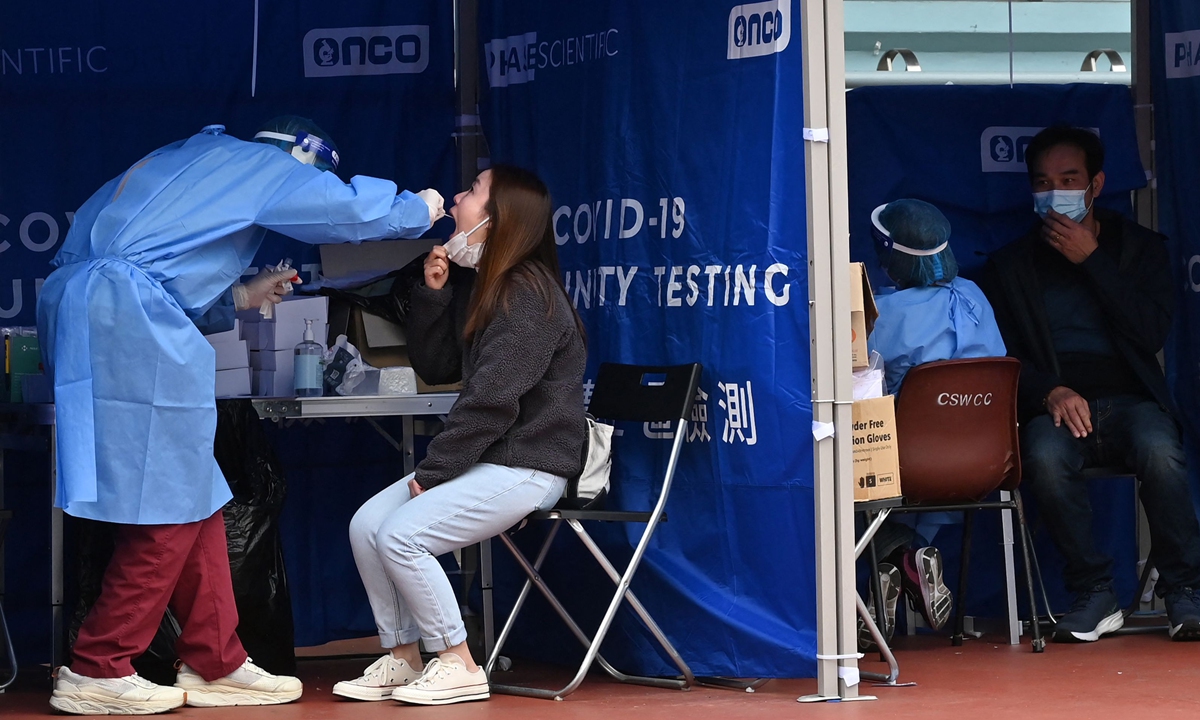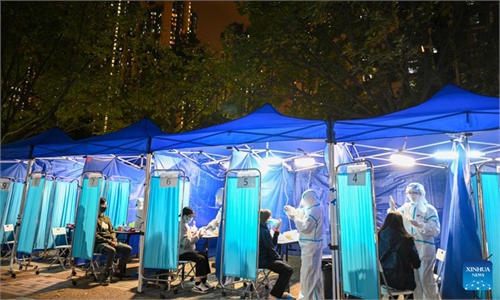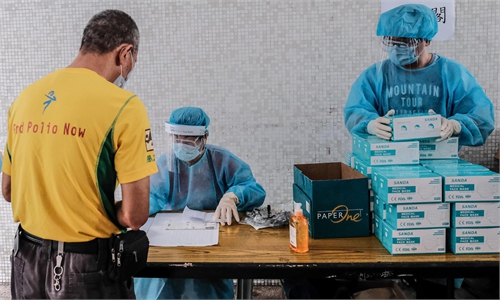HK to stick to 'dynamic zero' strategy amid COVID surge, Lam says
City beefs up social restrictions, closes more public venues

A woman is tested at a mobile specimen collection station for COVID-19 in Hong Kong's Prince Edward district on February 8, 2022, as authorities scrambled to ramp up testing capacity following a record high of new infections. Photo: VCG
The Hong Kong Special Administrative Region beefed up social restrictions on Tuesday, limiting the number of social gatherings to two people and issuing closure orders to public venues such as hair solons and religious buildings amid a surge of COVID-19 cases characterized by the highly-contagious Omicron, echoing the city's decision to stick to the dynamic zero strategy.
In less than two weeks since the start of the Chinese Lunar New Year, the number of confirmed COVID-19 cases in Hong Kong has continued to climb to record highs. On January 27, the number of confirmed cases was 164 on a single day, and during the last weekend the daily number exceeded 300 and the number reached 614 on Monday. Media reports said the number of cases on Tuesday is likely to be around 800.
"The current epidemic number is very shocking… We still feel that this is the best strategy for Hong Kong, using all our capacity and our means to ensure that we could achieve the 'dynamic zero' target--that is, we should contain the spread of the virus as much and as fast as possible," Chief Executive Carrie Lam Cheng Yuet-ngor said on Tuesday.
Echoing the dynamic zero strategy - "best option for Hong Kong," the city also banned family gatherings of more than 2 families in private places; people who fail to receive mandatory testing doubled the fine from HK$5,000 to HK$10,000.
Jin Dongyan, a biomedical professor at the University of Hong Kong, told the Global Times these measures are essential to reduce viral transmissions among communities as the epidemic is characterized by the highly-contagious Omicron. Previous social restrictions issued by the government were good but those had not been well implemented by residents, which is one of the reasons for such high numbers of infections after the Chinese Lunar New Year, a time for family reunions, Jin said, calling residents to trust the government and strictly follow those new measures.
A Hong Kong resident surnamed Lee told the Global Times that "my company insists everybody go to the office after the Chinese New Year, despite the surging number of confirmed cases. It's horrifying. Why can't they learn from the mainland and limit the number of people in the office."
Despite the fact that the Omicron outbreak will not generate as many severe cases, it is highly contagious and could infect elder people easily. People should pay attention to it, Jin noted.
Worries lingered around the city with testing venues across the city seeing long lines and some grocery stores running out of stock, media reports said.
An increase in testing among residents is another reason for the infection surge, experts said.
Lam said the reason why the "dynamic zero" suits the current situation of Hong Kong the best is that there are still 500,000 seniors unvaccinated despite the promotion of vaccinations in nearly a year. If they contract the virus, they could risk being severely infected or even die which will add further pressure to the medical system of the city.
Coexisting with the virus won't work in Hong Kong, considering the aging population in Hong Kong and relatively low vaccination rate. If we abandon the dynamic zero-tolerance policy, those who would be hit first would be the elderly people, and a growing number of infections would crush our health system, Tam Yiu-chung, a member of the National People's Congress Standing Committee from Hong Kong, told the Global Times on Tuesday.
The recent epidemic surge is not because the dynamic zero-case policy was not suitable for the city anymore, but because the contagious virus has spread among communities due to super-spreaders, Jin told the Global Times, dismissing the speculation of foreign media that the financial hub is being pressured from the mainland to forcibly continue the anti-epidemic approach.
Hong Kong has been following the dynamic zero-case policy and has proven to be effective in previous rounds of epidemic in the city. The Chinese mainland has been sticking to the dynamic zero strategy and that is the right way to achieve the goal of eventually opening up the border to the outside world, Jin noted.
Tam also said that the anti-epidemic experiences in the mainland where the dynamic zero-case policy has been successfully implemented proved that the policy is correct. "Will we pay the price like the US where the death toll exceeded 900,000? That would lead to a social shock here," Tam noted.
Hong Kong residents are on edge waiting for the border opening between the city and the Chinese mainland, Lee said, adding that the new surge has dashed the hopes of many to re-open the border.
On Tuesday, Lam revealed that the central government has been caring about Hong Kong's epidemic situation and the Hong Kong and Macao Affairs Office of the State Council expressed encouragement and support to the city, hoping the city could boost confidence and control the epidemic. The central government will offer help to the SAR.
If we need anything, we could also directly contact the Guangdong provincial government. Testing staff have already arrived in Hong Kong, she said.


